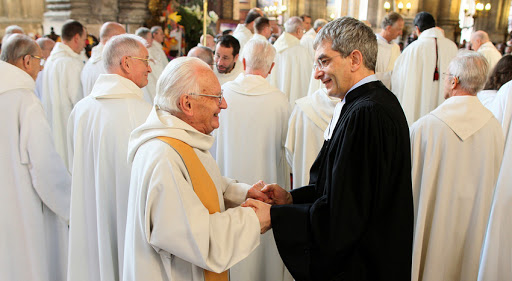One of the great divisions between Catholic and Protestant theology regards the understanding of how grace, the gift of God won for humanity by the sacrifice of Jesus Christ, works on the human soul. This division essentially became a disagreement between the Catholic Church and the Protestant reformers of the 16th century about man’s justification, or means of salvation – a matter that remains a source of tension even today.
The Protestant reformers of the 16th century supported the idea that grace works extrinsically on the human person; it does not penetrate and cleanse human nature from within. Martin Luther, a central figure of the Protestant Reformation, taught that after baptism, original sin remained. Grace acts as a sort of cloak which covers the corruption of human nature and makes the person acceptable to God, though underneath he remains depraved. Luther is famously credited with having said that the justified soul is a “snow-covered pile of dung.”
What follows from this understanding of grace is the Protestant teaching that a person’s actions are worth nothing toward his or her justification, since they come from a sinful source. From this has emerged the doctrine of sola fide, or justification by “faith alone”. Evangelical Protestants identify the moment of justification as the moment when the person experiences, for the first time, genuine faith – this moment is what the well-known phrase “born again,” (John 3:3) means for them. Protestants consider good works and taking after the example of Christ as a process of becoming holy, which is distinct from justification.
The Catholic teaching, on the other hand, is that grace does indeed work intrinsically, and that in Baptism the person is truly made a “new creation” (2 Cor. 5:17). “The grace of the Holy Spirit has the power to justify us, that is, to cleanse us from our sins and to communicate to us ‘the righteousness of God through faith in Jesus Christ’ (Rom 3:22) and through Baptism,” the Catechism of the Catholic Church teaches. And the Second Vatican Council re-affirmed that “[t]he followers of Christ … are justified in the Lord Jesus, because in the baptism of faith they truly become sons of God and sharers in the divine nature. In this way they are really made holy. Then too, by God's gift, they must hold on to and complete in their lives this holiness they have received” (Lumen Gentium, #40).
So baptism fully cleanses the human person of original sin, though the tendency to sin remains and keeps us in need of ongoing grace, especially through the Sacraments. And against the notion of justification by faith alone, the Church teaches that we are saved not only through faith but also through the expression of this faith in good actions. "My brothers, what good is it to profess faith without practicing it? Such faith has no power to save one, has it?” wrote St. James (James 2:14), in the epistle which Luther significantly called a “perfect straw-epistle” compared to the writings of St. Paul, who emphasized the need for faith.
During his pontificate, Pope Benedict XVI offereda helpful re-casting of this long-standing disagreement between Catholics and Protestants about grace and justification. According to the Pontiff, “the centrality of justification without works, the primary object of Paul’s preaching, does not clash with faith that works through love; indeed, it demands that our faith itself be expressed in a life in accordance with the Spirit. Often there is seen an unfounded opposition between St. Paul’s theology and that of St James, who writes in his Letter: ‘as the body apart from the spirit is dead, so faith apart from works is dead’(2: 26). In reality, while Paul is primarily concerned to show that faith in Christ is necessary and sufficient, James accentuates the consequential relations between faith and works (cf. Jas 2: 24). Therefore, for both Paul and James, faith that is active in love testifies to the freely given gift of justification in Christ.”
What is the difference between the Catholic and Protestant understandings of grace?

© Fred de NOYELLE / GODONG
A Catholic priest and a Protestant pastor
Anna Krestyn - published on 03/12/13
Tags:
Enjoying your time on Aleteia?
Articles like these are sponsored free for every Catholic through the support of generous readers just like you.
Help us continue to bring the Gospel to people everywhere through uplifting Catholic news, stories, spirituality, and more.
Top 10
See More
Newsletter
Get Aleteia delivered to your inbox. Subscribe here.
